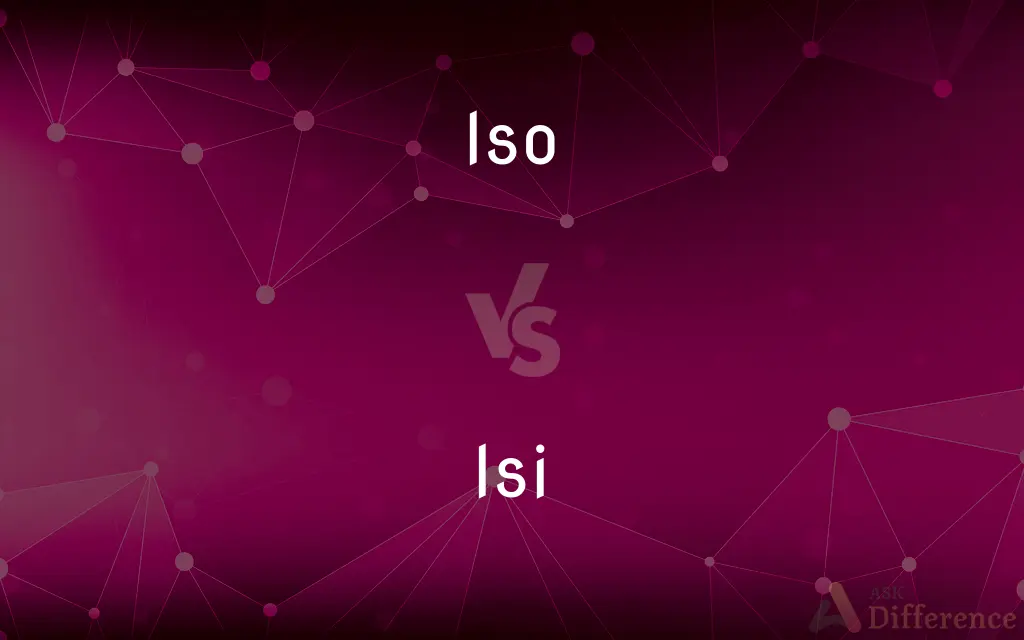ISO vs. ISI — What's the Difference?
By Tayyaba Rehman — Published on October 3, 2023
ISO refers to the International Organization for Standardization, which develops global standards, whereas ISI stands for the Indian Standards Institute, an agency for standardization in India.

Difference Between ISO and ISI
Table of Contents
ADVERTISEMENT
Key Differences
The International Organization for Standardization (ISO) is a globally recognized entity that formulates and promotes international standards for various industries. In contrast, ISI, or the Indian Standards Institute, focuses primarily on standardizing products and services within India.
ISO's influence is broad, encompassing a myriad of sectors from technology to food safety. Its standards, like ISO 9001, are recognized worldwide and ensure quality, efficiency, and safety. Conversely, ISI serves as a mark of quality in India, ensuring products and services in the country meet the stipulated criteria set by the Bureau of Indian Standards (BIS).
The objective of ISO is to simplify international trade by providing a unified framework of standards that every country can adhere to. ISI, on the other hand, is more nationally oriented, aiming to provide the Indian consumer with reliable quality assurance.
Both ISO and ISI have their own set of criteria, certifications, and methodologies. While companies globally seek ISO certification for wide acceptance, in India, the ISI mark is especially crucial for certain categories of products, as mandated by the government.
The distinction between ISO and ISI is primarily their scope and jurisdiction. While ISO operates and is recognized at a global scale, ISI is specific to India and is a testament to a product's quality and safety in the country.
ADVERTISEMENT
Comparison Chart
Jurisdiction
Global
India
Main Objective
Develop international standards
Standardize products/services in India
Recognition
Widely recognized worldwide
Recognized primarily in India
Types of Standards
Varies (e.g., ISO 9001 for quality management)
Product-specific, often mandated for certain items in India
Parent Organization
Independent body
Bureau of Indian Standards (BIS)
Compare with Definitions
Iso
Recognized in many countries across the globe.
Their ISO certification helped them expand their business overseas.
Isi
It's a certification mark used in India.
The ISI certification on the helmet ensures its reliability.
Iso
Aims to ensure quality, safety, and efficiency.
ISO standards in healthcare help hospitals maintain safety protocols.
Isi
Signifies standardization and quality within India.
Consumers often look for the ISI mark when buying electrical goods.
Iso
Influences international trade and cooperation.
By adhering to ISO standards, manufacturers can ensure their products are globally accepted.
Isi
Used for products to indicate conformity to statutory Indian standards.
Water purifiers with an ISI mark meet the necessary Indian standards.
Iso
Establishes standards for various sectors worldwide.
The ISO 27001 standard focuses on information security management systems.
Isi
ISI is the mark of the Bureau of Indian Standards.
The appliance had an ISI mark, indicating its quality and safety.
Iso
ISO is an independent, non-governmental international organization.
The company achieved ISO certification for maintaining high-quality standards.
Isi
Assures the Indian consumer of product quality.
With an ISI mark, the product has gone through rigorous quality checks.
Iso
An organization, the International Organization for Standardization, that sets standards in many businesses and technologies, including computing and communications.
Isi
The Pakistan intelligence agency; a powerful and almost autonomous political and military force; has procured nuclear technology and delivery capabilities; has had strong ties with the Taliban and other militant Islamic groups
Iso
(colloquial) isolation
Iso
Quarantine measures in order to mitigate the spread of communicable diseases, such as Covid-19.
Iso
An isolation play in basketball or American football.
Iso
(category theory) isomorphism
Common Curiosities
Is ISO recognized only in specific countries?
No, ISO standards are recognized and used globally.
Can a product have both ISO and ISI certifications?
Yes, a product can be ISO certified for global standards and have an ISI mark for Indian standards.
Who oversees the ISI mark?
The Bureau of Indian Standards (BIS) oversees the ISI mark.
For which products is the ISI mark mandatory in India?
The ISI mark is mandatory for certain products like electrical appliances, cement, and gas cylinders, among others.
How often are ISO standards reviewed?
ISO standards are reviewed every five years to ensure they remain relevant.
What is the purpose of ISI?
ISI signifies standardization and quality for products within India.
How many standards has ISO published?
ISO has published over 23,000 international standards covering various sectors.
Can ISO standards influence international trade?
Yes, ISO standards can facilitate international trade by ensuring products/services meet global standards.
What does the ISI mark on a product indicate?
The ISI mark indicates that the product conforms to the specific Indian standard set by BIS.
How long has ISI been in existence?
ISI, now known as BIS, was established in India in 1986.
Who can apply for an ISI certification?
Manufacturers and producers in India can apply for ISI certification for their products.
Are ISO standards applicable to any industry?
Yes, ISO standards cover a wide range of industries from technology to food safety.
What does ISO stand for?
ISO stands for the International Organization for Standardization.
Is getting an ISO certification mandatory for companies?
No, ISO certification is voluntary, but it can enhance a company's credibility and customer trust.
Share Your Discovery

Previous Comparison
Dynamic vs. Process
Next Comparison
TIFF vs. PNGAuthor Spotlight
Written by
Tayyaba RehmanTayyaba Rehman is a distinguished writer, currently serving as a primary contributor to askdifference.com. As a researcher in semantics and etymology, Tayyaba's passion for the complexity of languages and their distinctions has found a perfect home on the platform. Tayyaba delves into the intricacies of language, distinguishing between commonly confused words and phrases, thereby providing clarity for readers worldwide.













































